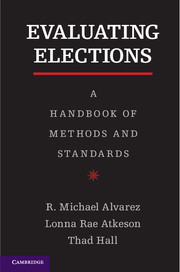Book contents
- Frontmatter
- Contents
- Acknowledgments
- Introduction
- 1 The Electoral Ecosystem
- 2 Easily Available Data for Performance Evaluation
- 3 Measuring the Experiences of Voters
- 4 Measuring the Performance of Poll Workers
- 5 Auditing the Election Ecosystem
- 6 Election Observation
- Conclusion
- Appendix: Precinct Opening, Closing, Election Day Forms
- References
- Index
Introduction
Performance-Based Evaluation of Election Administration
Published online by Cambridge University Press: 05 December 2012
- Frontmatter
- Contents
- Acknowledgments
- Introduction
- 1 The Electoral Ecosystem
- 2 Easily Available Data for Performance Evaluation
- 3 Measuring the Experiences of Voters
- 4 Measuring the Performance of Poll Workers
- 5 Auditing the Election Ecosystem
- 6 Election Observation
- Conclusion
- Appendix: Precinct Opening, Closing, Election Day Forms
- References
- Index
Summary
There are a common set of questions journalists, election administrators, and candidates sometimes ask about the administration of elections in the United States and internationally. A reporter from a local newspaper will ask whether recent elections in the area were run well. During an interview with a national media outlet, one of us will be asked, in our roles as academics who study election administration, to opine about whether some state has recently done a good job administering a presidential, primary, or other federal, state, or local election. More broadly, we have been asked by journalists from other countries to evaluate how well elections across the United States have been run since the 2000 presidential election.
Although these questions may seem simple, they are inherently difficult and complicated because (1) election administration involves a complex set of procedures, (2) there are many possible aspects of an election to consider to determine if it was “run well,” and (3) currently there is no accepted framework to assess the general quality of an election. More troubling, the question is focused solely on making a snap judgment about a given election – without taking the context of the election or the jurisdiction into account – and is not concerned with improving election management.
- Type
- Chapter
- Information
- Evaluating ElectionsA Handbook of Methods and Standards, pp. 1 - 18Publisher: Cambridge University PressPrint publication year: 2012

